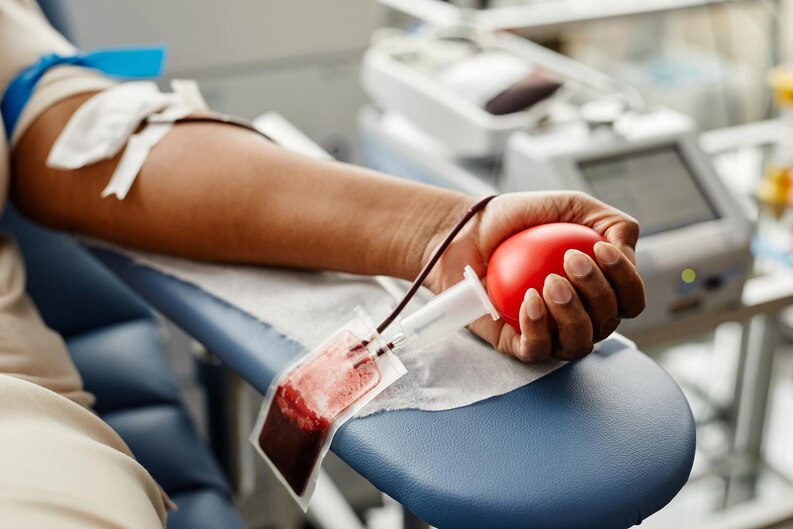Blood donation is a simple act of generosity that can profoundly impact the lives of people facing medical emergencies, surgeries, or chronic conditions. Every donation can save multiple lives, making donors a crucial part of the healthcare system. Here’s how blood donation makes a lifesaving difference:
1. Emergency Trauma and Accident Victims
In cases of severe trauma—such as car accidents, natural disasters, or violent injuries—patients often lose significant amounts of blood. Immediate transfusions are critical for their survival. Blood donors provide the life-saving blood that helps restore volume, maintain circulation, and prevent shock in these emergency situations. Without quick access to blood, many trauma victims wouldn’t survive.
2. Surgical and Medical Procedures
Many major surgeries, including organ transplants, heart surgeries, and joint replacements, require blood transfusions. These procedures often involve significant blood loss, and donated blood is essential to keep patients stable during and after surgery. For organ transplant patients, blood transfusions ensure the body can handle the new organ and avoid complications.
For some complex medical procedures, like open-heart surgery, patients may need multiple blood units. Without an adequate blood supply, doctors wouldn’t be able to perform these life-saving surgeries.
3. Cancer Treatment and Blood Disorders
Cancer patients, especially those undergoing chemotherapy or radiation, frequently rely on blood transfusions. These treatments can reduce the production of healthy blood cells, leading to conditions like anemia, bleeding issues, and low platelet counts. Blood and platelet transfusions help these patients maintain their strength, fight infections, and recover from treatments.
For people with blood disorders like sickle cell disease or thalassemia, regular blood transfusions are part of their ongoing care. These patients depend on blood donors to manage their condition and live healthier lives.
4. Childbirth Complications
Complications during childbirth, such as hemorrhaging, can be life-threatening without blood transfusions. Blood loss during labor or after delivery is a common cause of maternal death worldwide, especially in developing regions. Having access to donated blood can be the difference between life and death for mothers experiencing severe bleeding during or after childbirth.
5. Support for Premature Babies and Neonates
Newborns, especially premature babies, may require blood transfusions if they suffer from anemia or complications during birth. Premature infants often have underdeveloped bodies, and their ability to produce red blood cells might not be sufficient. Blood transfusions can support their growth and development, giving these tiny patients a better chance at life.
6. Chronic Illnesses and Medical Conditions
People with chronic illnesses, such as kidney disease, liver disease, or heart failure, may require regular blood transfusions to manage their conditions. For example, patients undergoing dialysis for kidney disease often experience anemia and benefit greatly from red blood cell transfusions. Similarly, individuals with liver disease may need plasma transfusions to help their blood clot properly and prevent excessive bleeding.
7. Help During Natural Disasters and Crisis Situations
Natural disasters, like earthquakes, floods, or pandemics, often result in an increased demand for blood. In these crisis situations, blood donors are essential in replenishing blood supplies for hospitals treating large numbers of injured people. Regular blood donations help ensure that blood banks are well-stocked in case of sudden surges in demand.
The Ripple Effect of Saving Lives
One of the most impactful aspects of blood donation is its ripple effect. A single donation can help up to three people because the blood is separated into its components—red cells, plasma, and platelets—each of which can be used to treat different patients. This means that your contribution doesn’t just save one life, but potentially several.
For example:
- Red blood cells help patients recovering from surgery or trauma.
- Platelets assist those undergoing cancer treatments.
- Plasma aids individuals with clotting disorders or severe burns.
Every donation is a lifeline for someone in need, whether it’s a cancer patient, a trauma victim, a premature baby, or a mother in childbirth.
Blood Donation’s Global Impact
Blood donations are vital in communities worldwide. In some parts of the world, particularly in developing countries, access to safe blood is limited, and patients die from treatable conditions due to a lack of available blood. Regular blood donations ensure hospitals around the globe have the blood they need to save lives, no matter the situation.
A Simple Act, a Lifesaving Outcome
By donating blood, you give the gift of life. It’s a simple, selfless act that has an immeasurable impact on people battling life-threatening conditions. Whether it’s helping a cancer patient recover, saving the life of a trauma victim, or supporting a newborn baby, blood donations play a crucial role in the healthcare system. You may never meet the people you save, but your blood will forever be part of their survival story.
